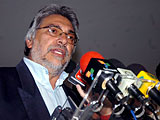Paraguay under Lugo’s watch
By Eliot Brockner for ISN
Fernando Lugo was sworn in as President of Paraguay on 15 August 2008. A former bishop who spent years fighting for equality for landless indigenous workers in San Pedro department, Lugo stated in his inaugural address that he would fight the external pagerampant corruptioncall_made and favoritism in Paraguayan politics and society that had blossomed under 61 years of single party rule.
Six months into his presidency, three key challenges have emerged in Lugo’s attempt to shake up the old guard. How he has thus far handled these challenges may lend insight into how he plans on instituting change in Paraguay and broader implications for regional security. Interestingly, they all concern Brazil.
The first of these issues has been the renegotiation of energy distribution at Itaipú Dam, long a sore spot for many Paraguayans. The dam, a bi-national venture between Brazil and Paraguay, generates its power from the convergence of rivers that flow on both sides of the border. It is South America’s largest hydroelectric plant, and provides energy to nearly all of Paraguay and a good portion of Southern Brazil. As per the current treaty, Paraguay sells excess energy generated at Itaipú for external pagebelow-market valuecall_made to Brazil. Lugo has repeatedly called for negotiations for a price adjustment on this energy, although thus far Brazil has been unresponsive to Lugo’s requests.
The second key issue has been the impact of a strained relationship between landless Paraguayan peasants (many of whom Lugo represented as bishop of San Pedro) and the so-called “Brasiguayos.” Brasiguayos are landowners of Brazilian descent who own swaths of land in Paraguay. Their land in the Eastern departments of Paraguay is ideal for soybean production.
Since Lugo has been president, there have been various anti-Brazilian protests and even violence directed at prosperous Brasiguayos. Most complaints are focus on perceived Brasiguayo injustice, including workers’ rights and external pageexpulsionscall_madeof Paraguayan citizens from land in Paraguay, unequal land distribution and unfair pay.
The final and perhaps most immediately significant issue has been the implementation of external pageOperation Jeroviacall_made. Determined to stop the drug smuggling that has turned Paraguay into the world’s second largest external pagemarijuana producercall_made (behind Mexico) and a external pagehavencall_made for illegally imported arms into Brazil, Lugo has implemented a policy aimed at stopping the smugglers and destroying production by sending thousands of troops to Paraguay’s vulnerable borders.
Operation Jerovia’s principal aim is to curb illicit drug smuggling along Paraguay’s borders with Brazil by destroying production of marijuana. According to a report by the LaRouche Political Action Committee, marijuana production in Paraguay generates an estimated annual external pageUS$3.6 billioncall_made in Paraguay’s informal economy. In response, Lugo has committed fully to the program; he recently called for the establishment of a military base in Tacuati, a small town in the northern part of San Pedro province.
There are two main risks associated with increasing military presence in the region. The first is armed resistance from Paraguayan farmers, many of whom have formed external pagelocal militiascall_made such as the People’s Army of Paraguay (EPP) linked to attacks on military outposts in the region. Increasing military presence in San Pedro may cause internal conflict amongst Paraguayans and could exacerbate the already fragile relationship between productive Brasiguayo ranchers and Paraguayan workers.
The other major risk is a reaction from the international Drug Trafficking Organizations who control the billion dollar marijuana industry in Paraguay. With Jerovia in full effect (in January 2009, external page416 hectarescall_made of marijuana were destroyed in Paraguay, compared to 293 hectares in January of 2008), Lugo is taking on forces whose strength and influence are just as strong, if not stronger, than that of the Paraguayan army.
If the shortcomings of the supply-side war on drugs in Colombia, Peru and Bolivia and the increase in violence in Mexico are any indication, an increase in military presence and concerted effort to destroy supply could have disastrous consequences in the region.
Much of the success of Lugo’s efforts, especially Operation Jerovia, will depend upon his ability to effectively cooperate with Brazil. A large portion of the marijuana grown in Paraguay is exported to Brazil, and is controlled by organized crime syndicates that are able to operate with near impunity because of their strength and power in relation to Brazilian police. Lugo could appeal to the mutual benefit of curbing drug smuggling in hopes of gathering Brazilian support - a key element to regional security.
However, despite ideological similarities, his relationship with Brazilian President Luiz Inácio Lula da Silva has been rocky. The two do not see eye to eye on Itaipú, and the violence aimed at Brasiguayos during Lugo’s tenure has alarmed the Brazilian government. Anti-Brazil external pageprotestscall_madehave sprung up in San Pedro, Itapúa and Alto Paraná departments against Brazilian land ownership in Paraguay, which has prompted external pagemilitary exercisescall_made by the Brazilian army on the Paraguay-Brazil border near Itaipú Dam, further damaging relations.
Lugo’s initial difficulties with Brazil will be a barrier to effective future cooperation. The lack of focused bi-lateral cooperation will hurt Operation Jerovia’s chances of success. Furthermore, Brazil and Paraguay’s continued bickering will distract them from curbing illegal arms and drug smuggling across the Brazil-Paraguay border. International crime organizations may take advantage of. Paraguay’s push to terminate exports of the nation’s number one cash crop, which will ruffle feathers in the region, and Lugo must tread carefully to not alienate Brazil, his largest and most immediate foreign support base.

